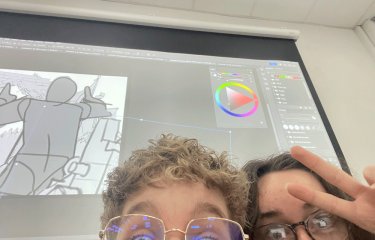How you can make industry connections while studying at Falmouth
24 January 2024

This article was written by Fashion Marketing BA(Hons) student Mairead.
Moving to a University that is based in a small seaside town, such as Falmouth, may leave you wondering about how many opportunities will be available for you to build a robust network of industry connections. Contrary to this common misconception, Falmouth University not only offers a thriving creative community, but it also offers loads of opportunities for students to bridge the gap between academia and your chosen industry.
As a Student Ambassador, I especially have had the chance to see first-hand how many ways Falmouth helps its students to forge meaningful connections within the professional industry.
Falmouth shows its great commitment to its students' success through the calibre of the academic staff and technical teams they hire. The faculty at Falmouth brings a wealth of industry experience, ensuring that students receive not only theoretical knowledge, but also practical insights that are relevant to their future careers. Personalised mentorship and guidance from industry professionals creates an environment where students can develop not only academically, but also professionally. For example, last semester my class got the opportunity to gain feedback on a PR Event that we had proposed and it helped me realise how my perspective on certain things were from an academic standpoint and clashed with the real-life view.
State-of-the-art facilities at Falmouth further contribute to the immersive learning environment. From cutting-edge studios to collaborative workspaces, students have access to an array of facilities that simulate professional settings. Falmouth's dedication to providing a real-world learning experience is exemplified by its policy of allowing students to hire out industry-standard equipment for free! Whether it's high-end cameras, cutting-edge design software, or advanced audio recording equipment, students have unrestricted access to tools that mirror those used in professional settings. This not only enhances their skills, but also allows them to produce work that meets industry standards.
Falmouth University actively bridges the gap between academia and industry by organising guest lectures featuring prominent professionals from various fields. These sessions provide students with valuable insights, foster networking opportunities and expose them to diverse perspectives within their chosen industries. Additionally, organised trips to industry locations give students a first-hand look at how their skills can be applied in real-world scenarios.
Falmouth recognises the importance of practical experiences in shaping a successful future career. The university facilitates work experience opportunities, allowing students to apply their knowledge in real-world settings. Moreover, the support for portfolio building is integral, with guidance provided on creating a compelling showcase of skills and achievements that resonates with industry expectations. Falmouth University goes beyond traditional internships by offering micro-internships - short-term, intensive experiences that provide valuable exposure to industry practices. Additionally, study abroad exchange opportunities open doors for students to gain a global perspective and further expand their professional networks. Falmouth also offers the option for students to be on a Professional Placement Year degree, which means in the third year you take a year out to work in industry. I, myself, am on a professional placement year degree and am currently in the application and interview process of finding a job for the next academic year.
This leads onto the dedicated Employability Team at Falmouth, who I have looked to for help and guidance many times. They play a pivotal role in assisting students in their transition from university to professional work. Offering workshops, one-on-one consultations, and career guidance, the team ensures that students are well-equipped to navigate the competitive job market upon graduation.
Falmouth University can be known for its smaller class sizes and the many advantages of this cannot be overstated. This allows for more personalised support and fosters a collaborative learning environment, where students can engage with their peers and instructors on a deeper level. The sense of community within smaller classes enhances the overall educational experience. It also means you can’t hide in class, which may seem like a negative, but trust me, when you're lost or a bit stuck and you don't have to ask for help before it's offered, it is a big positive. Lecturers are able to get to know you personally, how you work and what's best for you.
While some may disregard Falmouth University due to its geographical location in the South West of England, the University has proven itself by giving its students not only a world-class education, but also gaining a competitive edge in their respective industries.





